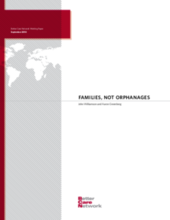Understanding the evidence and impetus for change and global care reforms
Before considering the nuances of transition from residential care to family-based care, it is important to first understand the reasons why there is a global shift away from the use of residential care for children and what is driving these changes.
The aim of this step is therefore to develop a high-level understanding of the reasons why care and child protection systems are being reformed across the world and why residential care for children is being scaled back and replaced with family-based care.
This step is focused on learning. Key actions may include facilitating or participating in learning through:
- Workshops
- Forums
- Webinars
- Advocacy events
- Conferences
- Trainings
- Online discussions
- Self-led learning
- Access to relevant learning resources
Learning topics that may be important to explore during this step include:
- The risks and impacts of institutionalisation on children’s development and wellbeing
- The importance of the family environment for children’s optimal development
- The reason for the prioritization of family-based care
- The international child rights framework: International norms and commitments underpinning global care reforms
- What are care reforms: Strengthening and transforming child protection and care reform systems to better protect the rights and best interests of children
- The continuum of care
- Decision making in the best interests of the child, including the necessity and suitability principles.
- Understanding how residential care service transitions fit into the continuum of care and broader child protection and care reform efforts
- Perspectives of care experienced young people and children
- The role of donors, partners and volunteers in supporting the rights and best interests of vulnerable children
- Faith Perspectives: Looking at children’s care and protection through a faith-based lens (for faith actors)
The key milestones associated with this step are, organizations key decision makers demonstrate:
- A level of understanding of what is driving the changes to children’s care and the shift away from residential care towards family-based care.
- An in-principal agreement with the prioritization of family-based care for children
- Readiness to explore the implications of transition to family-based care for the individual organisation in the specific local context
Resources
Displaying 31 - 31 of 31
With particular attention to lower income countries, this paper examines the mismatch between children’s needs and the realities and long-term effects of residential institutions. The paper examines available evidence on the typical reasons why children end up in institutions, and the consequences and costs of providing this type of care compared to other options. The paper concludes with a description of better, family-based care alternatives and recommendations for policy-makers.

